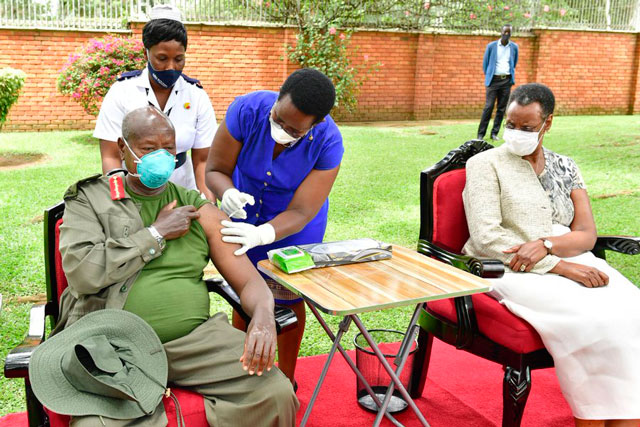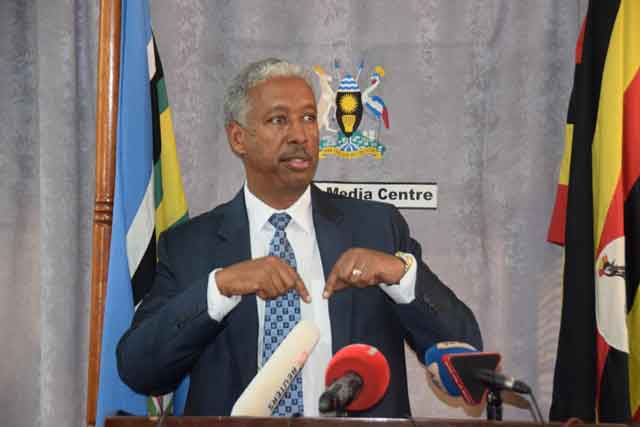
WHO assures availability of vaccine doses as manufacturer gets stretched
Kampala, Uganda | RONALD MUSOKE | Uganda’s COVID-19 vaccination exercise has added speed over the last two weeks following President Yoweri Museveni’s getting vaccinated publicly on March 27.
Dr. Jane Ruth Aceng, the Minister of Health said April 8 that Museveni and his wife, Janet Kataaha Museveni’s public taking of the COVID-19 jab has boosted public confidence. She said uptake of the vaccine has soared beyond what the ministry recorded two weeks after the launch.
The Ministry of Health officially launched the vaccination exercise on March 10 following the arrival of 964,000 doses of the vaccine in early March, thanks to a COVAX Facility consignment (864,000 doses) and a donation of 100,000 doses from the Indian government. But uptake of the vaccine from the target population remained slow in the first days of the exercise.
President Museveni’s public show of hesitancy five days into the vaccination exercise did not help the health ministry’s cause. Museveni is 75 years old and therefore qualifies to take the vaccine because people in his age-group are considered to be at high risk of infection and severe illness. But he had said on March 15 that “his people were still studying which one among the available vaccines on the market would be effective for him.”
“First of all, I am quite careful and well protected by the system here. Secondly, I am also looking at which of the vaccines should I go for… Johnson & Johnson, the Chinese, the Russian? Ours, a Ugandan one, will also come later, but maybe it will be used in the future,” Museveni said in a televised address.
Museveni’s hesitancy coupled with earlier speculation in the international and local media that the president and “members of his inner circle” had secretly taken the COVID-19 jab, long before vaccines arrived in Uganda worsened public hesitancy.
Even when Museveni dismissed the allegation and even threatened to sue The Daily Monitor which republished the allegation from The Wall Street Journal, Ugandans remained unconvinced. Some medical professionals who are among the priority list for vaccination refused to be vaccinated saying they would only do so if Museveni got vaccinated publicly.
After Museveni alongside his wife eventually getting vaccinated at State House in Kampala on March 27, he sent a direct message to Ugandans.
“First Lady Janet Museveni and I got our Covid-19 vaccine today in Nakasero. I encourage all Ugandans who qualify for this vaccination to go to health facilities and get it,” Museveni said.
Aceng said Museveni’s action and message made an impact.
“I am glad to report that we are now recording an increasing uptake of the vaccine. In the last few days, the demand of the COVID-19 vaccine has soared beyond what we recorded two weeks after the launch,” she said at the Ministry of Health headquarters in Kampala. Aceng said so far health professionals have inoculated over 144,000 people nationwide with the Oxford/AstraZeneca COVID-19 vaccine.
Speaking earlier, on March 02, ahead of the delivery of the first batch of vaccines and immediate vaccination exercise, Aceng said the government intended to inoculate 49.6% of the eligible population (about 22 million people) in a phased manner. She said each phase would cover 20% of the target population or 4,387,202 people.
Among the first priority of people to be vaccinated are about 150,000 health workers, 250,000 security personnel (UPDF, Police and Prisons) and about 550,000 teachers as well as 550,000 people with underlying health conditions aged below 50 years.
“All persons aged 50 years and above and those aged 18-50 years with co-morbidities such as cancer, hypertension, diabetes, and liver/heart/kidney disease are now eligible for COVID-19 vaccination.”
“All nationals and non-nationals resident in Uganda who fall in the above mentioned priority groups or categories should go for the COVID-19 vaccination at the designated health facilities,” she said.
Aceng particularly urged the health workers to embrace the COVID-19 vaccination exercise. She said it is their responsibility to set a good example and to educate the general public on the benefits of the COVID-19 vaccine.
“This vaccine will protect you, your families and the elders in your communities from hospitalization and death due to COVID-19.
“The ministry continues to encourage health workers to get vaccinated because they are vaccinating the rest of the population,” she said, “The population would want to know whether the health workers are vaccinated,” she said.
“That is why all of us here took the vaccine to encourage and reassure you. We may be able to give information in such forums but the health workers have a one-on-one interaction with clients and the clients may first ask the health worker whether they are vaccinated. Clients will be more confident when they know the health worker is vaccinated.”

Vaccine side effects
Dr Tegnen Yonas Woldemariam, the World Health Organisation Uganda Country Representative who flanked Aceng during the update noted that although there has been a lot of talk in regards to the AstraZeneca vaccine; especially in Europe of stopping the vaccine because of clotting problems and low count of platelets, both the European Medical Agency (EMA) and the UK regulator together with the WHO Strategic Advisory Group on Immunization have concluded that the vaccine is safe.
“Furthermore, some of the evidence is showing that the clotting of the blood and low count of platelets is far higher in people who have ever suffered from COVID-19 when compared to those who have been vaccinated.”
“The point is if a person gets COVID-19, they have more risk of dying from clotting disease than if they are vaccinated. In any vaccine, we will always have a very small risk and the risk with AstraZeneca is not far different from what we see in other vaccines for the WHO to recommend stopping the use of the vaccine” he said.
“The AstraZeneca vaccine is still safe and yes there are a few cases of clotting but compared to the over 200 million who benefitted from it, I think it is worth continuing with the vaccination.”
Aceng added that for every vaccination exercise, be it with the traditional vaccines or newly introduced vaccines or this emergency vaccine, the government always monitors the reactions.
“We monitor side effects and we monitor adverse events. We have regional teams that move from district to district to collect such reports. We also have an online system where any side effects or adverse events are reported immediately and action is taken.”
Dr. Alfred Driwale, the programme manager of the Uganda National Expanded Programme on Immunization (UNEPI) in the Ministry of Health noted that generally, the common side effects include fever, headache, abdominal pain, nausea, fatigue and pain at site. But in Uganda, the side effects so far reported are headache and fever.
“But these normally disappear by themselves. For those whose pain threshold is low, fluids and painkillers should help clear the side effects in one day or two,” he said.
Driwale noted that although the vaccination exercise is voluntary, the decision to be vaccinated should be informed by the awareness of what is happening around the world, regionally and an assessment of risk within the country and the individual of getting COVID-19 based on one’s occupation.
“That is when one should come to the conclusion that they don’t want to be vaccinated and one should prepare for whatever consequences when they get infected. The decision to be vaccinated or no should not be based on casual feelings.”
More worryingly, Dr. Henry Kyobe, a senior epediomologist and incident commander, National COVID-19 Response, said that Uganda’s surveillance system and genome sequencing at the Uganda Virus Research Institute at Entebbe has found out that the South African strain and another associated with the UK and Nigeria type are in the country.
Dr. Kyobe said the emergency of these variants is a big threat to Uganda’s emergency response (nationally and regionally) because it can easily reverse all achievements.
“The good news is that besides the ongoing vaccination exercise, the same measures of protecting against the primary variants are the same for protecting against the secondary variants (hand hygiene, regular use of hand sanitisers, avoiding reckless hand shaking, consistent masking, avoiding mass gatherings and congestion of people in one place and observing social distance.”
Next batch of vaccines
Meanwhile, the World Health Organization has moved to allay concerns over delays of about two months in releasing the next batch of the AstraZeneca vaccine from the Serum Institute in India.
The institute announced recently that its production lines were being stretched and it might not be able to meet production targets. The Indian government’s recent request to get over 160 million doses to inoculate its population as it battles a new wave of infections might affect supplies to some countries.
Uganda is due to receive about 3 million doses from the COVAX Facility by June this year. Uganda’s vaccination programme will, therefore, probably not be affected. Dr. Tegnen said there have been discussions between the manufacturer and the government of India to ensure that the vaccine arrives on time.
“The manufacturers intend to increase production between May and June so that the back log of supplies is cleared,” he said, “There might be a slight delay but I don’t think this delay will be much of a worry especially for the second dose since the second round of the dose can be given any time between 8-16 weeks.”
 The Independent Uganda: You get the Truth we Pay the Price
The Independent Uganda: You get the Truth we Pay the Price



